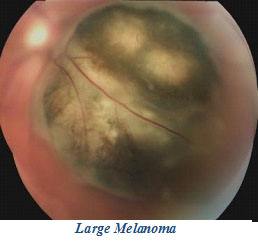Choroidal melanoma is a cancer of the eye that develops in the pigmented cells of the choroid. The choroid is composed of layers of blood vessels that nourish the back of the eye, located between the sclera and the retina. It is unusual for a choroidal melanoma to spread to other parts of the body, but similar to skin melanoma, it is possible.
Symptoms of Choroidal Melanoma
 Most patients exhibit no symptoms of choroidal melanoma and it is only discovered through routine eye examinations. If symptoms do occur, the patient might experience the following:
Most patients exhibit no symptoms of choroidal melanoma and it is only discovered through routine eye examinations. If symptoms do occur, the patient might experience the following:
- Growing dark spot on the iris (colored part of the eye)
- Sensation of flashing lights
- A change in the shape of your pupil (dark spot in center of the eye)
- Blurry vision in one eye
- Loss of peripheral (side) vision
- Floaters (small flecks) in your eye vision
Causes of Choroidal Melanoma
The exact cause of choroidal melanoma is not known, however, there is a strong association with exposure to ultraviolet (UV) light. Also, people with light eye color, of Caucasian descent, and older in age are at greater risk. Some skin disorders, such as dysplastic nervous syndrome or abnormal skin pigmentation of the face, are also at a greater risk for choroid melanoma.
Treating Choroidal Melanoma
The treatment of choroidal melanoma will depend largely on the size and location in the eye. The primary goal is to kill the tumor and decrease the chance of it spreading to the body. The second goal is to save as much vision as possible. A small choroidal melanoma might not need surgery right away, but requires close observation of the growth.
Radioactive Plaque Treatments
A patient with a medium or large-sized choroidal melanoma is generally treated with radiation therapy or laser treatment. Ophthalmic plaque radiation therapy is the most common therapy used, with a proven track record, that limits the need to remove part of the eye. The radiation will cause some decrease in vision over time, but rarely do patients lose all vision from this treatment.
Dr. Mason has been performing radioactive plaque treatments of melanoma since 1994. The radiation plaque treatment has a 90% chance of killing the tumor, with only a 10% chance of tumor recurrence. Laser treatment in the office typically has a 70% chance of killing small melanomas, but is not very effective for medium-sized and larger melanomas.
Call to schedule an appointment today 1-800-575-4314.
